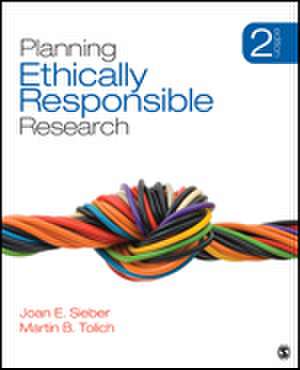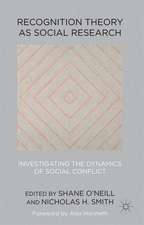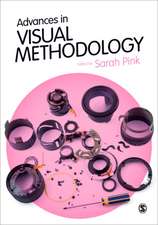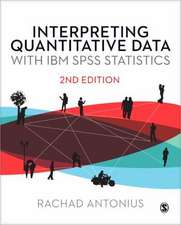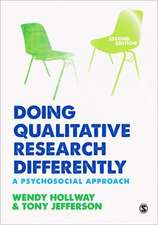Planning Ethically Responsible Research: Applied Social Research Methods, cartea 31
Autor Joan E. Sieber, Martin Tolichen Limba Engleză Paperback – 11 feb 2013
Din seria Applied Social Research Methods
- 26%
 Preț: 534.80 lei
Preț: 534.80 lei -
 Preț: 323.98 lei
Preț: 323.98 lei - 26%
 Preț: 537.02 lei
Preț: 537.02 lei - 22%
 Preț: 405.00 lei
Preț: 405.00 lei - 22%
 Preț: 405.12 lei
Preț: 405.12 lei -
 Preț: 457.79 lei
Preț: 457.79 lei - 15%
 Preț: 604.85 lei
Preț: 604.85 lei - 15%
 Preț: 605.03 lei
Preț: 605.03 lei - 20%
 Preț: 610.14 lei
Preț: 610.14 lei - 20%
 Preț: 610.80 lei
Preț: 610.80 lei - 15%
 Preț: 547.75 lei
Preț: 547.75 lei - 18%
 Preț: 786.24 lei
Preț: 786.24 lei - 15%
 Preț: 548.57 lei
Preț: 548.57 lei - 15%
 Preț: 604.71 lei
Preț: 604.71 lei - 15%
 Preț: 547.75 lei
Preț: 547.75 lei - 15%
 Preț: 549.22 lei
Preț: 549.22 lei - 15%
 Preț: 547.43 lei
Preț: 547.43 lei - 15%
 Preț: 550.06 lei
Preț: 550.06 lei - 20%
 Preț: 551.90 lei
Preț: 551.90 lei -
 Preț: 314.78 lei
Preț: 314.78 lei -
 Preț: 465.49 lei
Preț: 465.49 lei - 20%
 Preț: 608.46 lei
Preț: 608.46 lei - 15%
 Preț: 549.05 lei
Preț: 549.05 lei - 15%
 Preț: 602.08 lei
Preț: 602.08 lei - 15%
 Preț: 606.51 lei
Preț: 606.51 lei - 15%
 Preț: 549.22 lei
Preț: 549.22 lei - 20%
 Preț: 552.71 lei
Preț: 552.71 lei - 15%
 Preț: 550.06 lei
Preț: 550.06 lei - 15%
 Preț: 604.20 lei
Preț: 604.20 lei - 15%
 Preț: 605.36 lei
Preț: 605.36 lei - 15%
 Preț: 548.08 lei
Preț: 548.08 lei - 15%
 Preț: 606.15 lei
Preț: 606.15 lei - 15%
 Preț: 605.18 lei
Preț: 605.18 lei - 15%
 Preț: 611.09 lei
Preț: 611.09 lei - 15%
 Preț: 546.45 lei
Preț: 546.45 lei - 18%
 Preț: 716.88 lei
Preț: 716.88 lei - 15%
 Preț: 438.13 lei
Preț: 438.13 lei - 20%
 Preț: 553.37 lei
Preț: 553.37 lei - 18%
 Preț: 717.66 lei
Preț: 717.66 lei
Preț: 613.54 lei
Preț vechi: 721.81 lei
-15% Nou
Puncte Express: 920
Preț estimativ în valută:
117.42€ • 122.13$ • 96.93£
117.42€ • 122.13$ • 96.93£
Carte tipărită la comandă
Livrare economică 15-29 aprilie
Preluare comenzi: 021 569.72.76
Specificații
ISBN-13: 9781452202594
ISBN-10: 1452202591
Pagini: 264
Dimensiuni: 187 x 232 x 19 mm
Greutate: 0.45 kg
Ediția:Second Edition
Editura: SAGE Publications
Colecția Sage Publications, Inc
Seria Applied Social Research Methods
Locul publicării:Thousand Oaks, United States
ISBN-10: 1452202591
Pagini: 264
Dimensiuni: 187 x 232 x 19 mm
Greutate: 0.45 kg
Ediția:Second Edition
Editura: SAGE Publications
Colecția Sage Publications, Inc
Seria Applied Social Research Methods
Locul publicării:Thousand Oaks, United States
Recenzii
"Two important aspects covered in this text are the ethical considerations in qualitative research methodologies, and the attention that is needed in University Research Ethics Committees to understanding and addressing these methodologies."
“I particularly enjoyed the energetic and experienced tone of these writers and their willingness to take a stance...The chapters in the second half of the book on consent, confidentiality and autoethnography have thoughtful coverage of qualitative research issues. Equally welcome is their attempt to come up with constructive solutions rather than to simply criticize...The authors have established record in developing an evidence base on human research ethics and I shall be bringing their final chapter, with its ‘Ten Simple Solutions for Making Ethics Review a Learning Institution’, to my own ethics committee.”
“I particularly enjoyed the energetic and experienced tone of these writers and their willingness to take a stance...The chapters in the second half of the book on consent, confidentiality and autoethnography have thoughtful coverage of qualitative research issues. Equally welcome is their attempt to come up with constructive solutions rather than to simply criticize...The authors have established record in developing an evidence base on human research ethics and I shall be bringing their final chapter, with its ‘Ten Simple Solutions for Making Ethics Review a Learning Institution’, to my own ethics committee.”
Cuprins
Chapter 1. Introduction: Research Governance and Research Ethics
Chapter 2. Why We Need Ethics: Assessing Vulnerability, Risk and Benefit
Chapter 3. The Relevance of Ethical Theory to IRB
Chapter 4. A Retrospective IRB Review: Rehabilitating Milgram, Zimbardo and Humphreys
Chapter 5. Journalist Ethics Does Not Equal Social Scientists Ethics
Chapter 6. Community-Engaged Research and Ethnography: Extreme Misfits with the Medical Model
Chapter 7. Communicating Informed Consent and Process Consent
Chapter 8. Degrees of non-Disclosure
Chapter 9. Strategies for Assuring Confidentiality
Chapter 10. The Ethics for the Invisible, Powerless and Vulnerable Research Assistant
Chapter 11. Why IRBs Have an Important Place: The Autoethnographic Experiment
Chapter 12. Evidence-Based Ethical Problem Solving: A Research Agenda
Chapter 13. Making Ethics Review a Learning Institution: Ten Simple Suggestions
Chapter 2. Why We Need Ethics: Assessing Vulnerability, Risk and Benefit
Chapter 3. The Relevance of Ethical Theory to IRB
Chapter 4. A Retrospective IRB Review: Rehabilitating Milgram, Zimbardo and Humphreys
Chapter 5. Journalist Ethics Does Not Equal Social Scientists Ethics
Chapter 6. Community-Engaged Research and Ethnography: Extreme Misfits with the Medical Model
Chapter 7. Communicating Informed Consent and Process Consent
Chapter 8. Degrees of non-Disclosure
Chapter 9. Strategies for Assuring Confidentiality
Chapter 10. The Ethics for the Invisible, Powerless and Vulnerable Research Assistant
Chapter 11. Why IRBs Have an Important Place: The Autoethnographic Experiment
Chapter 12. Evidence-Based Ethical Problem Solving: A Research Agenda
Chapter 13. Making Ethics Review a Learning Institution: Ten Simple Suggestions
Notă biografică
Descriere
This book is an invaluable guide to help researchers and graduate students understand ethical concerns within real-life research situations.
